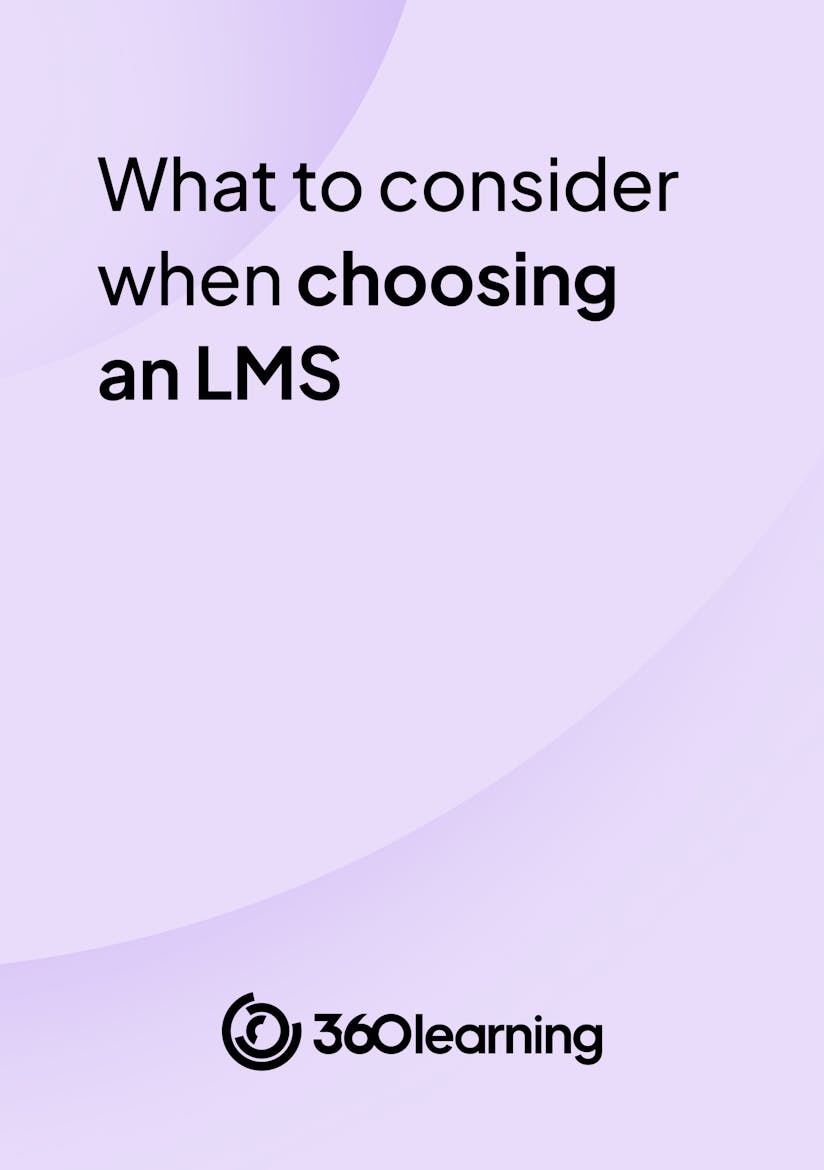
Discover the learning platform powered by collaborative learning.
A 15-minute discussion with an expert
100% tailored to your needs - with ❤️
No commitment. Free as can be.
As companies grow and expand, so do their operational and strategic challenges. When you have more staff, more customers, and more resources, everything from marketing, to finance, to company culture begins to change (and strain).
Learning and development is no different. You have new and increasingly complex training needs, and your legacy learning tools just can’t cut it. You now need to work faster than ever, with more learning paths and increasingly diverse skills required.
The only effective and efficient way to ship training content at scale is with an enterprise learning management system (LMS).
In this article, we'll explore the best tools on the market, the must-have features for your enterprise LMS, and share an RFP template that will make the final choice simple.

By providing your contact info, you agree to receive communications from 360Learning. You can opt-out at any time. For details, refer to our Privacy Policy.
An enterprise learning management system gives your large and diverse team the information and training they need, when they need it. Designed specifically for and suited to enterprise-level companies, the right LMS centralizes learning content and materials, streamlines (even automates) learning paths, and increases individual autonomy while keeping the L&D experts in control of the process.
Today, a modern and effective LMS solution will empower your team as you look to move the needle on those crucial metrics and prove impact to your stakeholders. An enterprise LMS even empowers your employees’ learning all around the globe, with highly accessible features like mobile learning, webinars, and interactive games.
It works just as well in-person or asynchronously, and lets learners complete actions at the best time for them.
We’ll look at the specific features to prioritize shortly, and you can scroll down now to see our top tool suggestions. But there are few characteristics of enterprise-worthy LMS systems that don’t apply to every solution.
If you’re looking to manage your large team successfully, you need an enterprise LMS that can grow alongside your company, provide insights into your learners’ performance, and help foster a collaborative learning experience. We’ll see some excellent examples shortly.
Here's a quick snapshot of the five top LMS platforms for large enterprises. We'll see each in far more detail shortly.
If your LMS cannot support a fast-growing workforce, you’ll likely hit a wall that limits your ability to deploy impactful employee training programs.
For example, if your LMS only allows 100 users but you have 1,000 learners, many team members will will miss out. And your learning solution can’t accurately track individual employee engagement or performance.
Key LMS features
If your LMS cannot support a fast-growing workforce, you limit your company’s ability to deploy impactful employee training programs.
A 15-minute discussion with an expert
100% tailored to your needs - with ❤️
No commitment. Free as can be.
By providing your contact info, you agree to receive communications from 360Learning. You can opt-out at any time. For details, refer to our Privacy Policy.
We can now streamline and even fully automate tasks like skills mapping, authoring, assessments, feedback and follow ups, and company-wide analysis. From speeding up the content creation process and ramping up course enrollment, to auto-tagging and deeper analytics and reporting, AI transforms the L&D professional from administrator and facilitator to a more strategic, value-adding leader.
Key LMS features

Reporting and analytics help you understand how well your eLearning training programs are performing and whether they’re ultimately working. Your training software should deliver in-depth reports that help you develop the best L&D programs possible.
An enterprise LMS without reporting and analytics essentially leaves you teaching in the dark.
Key LMS features
Here's one example of how we manage reporting in 360Learning:

An enterprise LMS without reporting and analytics essentially leaves you teaching in the dark.
Too many L&D programs simply buy a large content library and hope that employees will motivate themselves. Gamification offers learners tangible goals to work toward in the form of badges, achievements, or leaderboard spots.
And studies show that gamification increases the quality of work and the participation rate of learners. Here's how we incorporate gamification into training at 360Learning:
Key LMS features
Related: 6 Ideas for How L&D Teams Can Use Genially for Interactive Learning
Collaborative authoring lets you involve your entire company in course authorship, speeding up the online training creation process. Without it, the onus of creating courses falls solely on the L&D team.
Collaborative authoring support democratizes the learning process, giving your entire company the opportunity to take part in the creation of training.
Here's an example from 360Learning:

Key LMS features
AI authoring tools let you create courses fast, with personalized learning experiences to develop the most pressing skills needed. And while some platforms don’t let you author original content at all (at least without massive technical support), the best LMS systems have these tools baked in.
Key LMS features
For example, 360Learning’s authoring tool makes publishing easier, and lets you check course performance via built-in analytics and reporting.
As organizations start redefining themselves as skills-based organizations, the right enterprise LMS systems will need to include skills management features.
These features empower you to elevate your upskilling and reskilling training programs as you help learners develop the skills they need internally. They boost retention and lower the need to hire externally to fill skills gaps.
Key LMS features
Across large corporate learning programs, these AI-powered skills management features are a must-have for an enterprise LMS.

The following platforms meet all or most of the above criteria. They combine LMS, LXP, course library and authoring capabilities. They’re also remote-friendly, and for the most part easy to use.
360Learning is the AI-driven learning platform that unites LMS and LXP capabilities to streamline onboarding, accelerate employee growth, and scale customer education. 360Learning global enterprises transform in-house expertise into collaborative, skills-based learning for employees, customers, and partners.
Combining collaborative learning principles with seamless integrations into systems like SAP and Workday, the platform enables organizations to upskill at scale through expert-led communities of practice built around critical roles, functions, and strategic priorities.
More than 2,500 companies—including Safran, Cognizant, Bally’s Corporation, Duolingo, and Smile Brands—rely on 360Learning to drive learning in the flow of work. Since its founding in 2013, the company has raised $240 million and built a global presence across North America and Europe.
360Learning pioneered the collaborative learning movement, introduced the first AI certification program for L&D, and launched the L&D Collective to bring learning leaders together worldwide.
Known for:
Pricing: Plans from $8 per user/month. Custom enterprise pricing is available.
A 15-minute discussion with an expert
100% tailored to your needs - with ❤️
No commitment. Free as can be.
By providing your contact info, you agree to receive communications from 360Learning. You can opt-out at any time. For details, refer to our Privacy Policy.
TalentLMS has a user-friendly, intuitive interface that makes it simple for both instructors and learners to navigate. A good fit for large organizations, this learning management system offers ease of use and customizable options, catering to businesses with different levels of technical skill.
TalentLMS includes a range of tools for tracking learner progress and employee performance, managing courses, and adding gamification elements. It also supports multiple languages and allows the upload of SCORM, xAPI, or cmi5 files.
Additionally, it provides seamless eCommerce integrations, which is a bonus if you’d like to monetize courses. You’ll find further integrations with key HRIS, CRM, and business communication tools.
Known for:
Pricing: Core plan is $119 per month (up to 40 users); Premium Plan is $449 per month (up to 100 users). Custom plans are available upon request.
LearnUpon is an LMS designed to streamline and centralize organizational training, making it easier to manage, deliver, and monitor learning. Ideal for growing organizations, it’s a good option to implement while your organization is small and let it grow with you.
The platform is particularly effective for and primarily suited to customer education and education. It includes reporting tools to evaluate learner progress, built-in assessment features, and powerful plugins to enhance course enrollment. The logic is easy to understand, and aligning it with your organizational structure is straightforward.
LearnUpon uses an interactive course authoring tool to create content throughout the learning journey, such as microlearning, modules, or learning paths. It also supports SCORM and xAPI files, videos, and can incorporate blended learning methods.
Known for:
Pricing: Pricing via demo for the Essential (up to 150 users), Premium (150 to 500 users), and Enterprise (500 users and more) plans.
Enterprise businesses using the Microsoft Office suite of tools may find Learn365 intriguing. Zensai Learn365 is a learning platform integrated with Microsoft 365 and Teams, designed to seamlessly embed learning into daily work activities.
With Learn365, you can automate training management, ensuring employees stay up-to-date with essential health and safety, corporate, legal, policy, and other corporate content.
Additionally, monitoring completion rates is simple with features like Read and Understood confirmations, automated SOP publishing, and certificate management tools.
Known for:
Pricing: Quotes available on request.
Litmos is a cloud-based LMS professional learning and development. Ideal for corporate training courses, Litmos provides extensive content libraries, workflow integrations, easy user management, and comprehensive support services.
It’s known for its ease of use, customizable branding, mobile learning tools, and straightforward integrations with your existing systems. One particular value for enterprises: if you have multiple entities within the larger organization, you can set them up separately but still manage all from one place.
Litmos also prioritizes security with robust measures, including a secure hardware firewall to protect user data. The LMS integrates seamlessly with CRM tools, offering over 50 connectors and a powerful API.
Customers include major enterprises like IBM, YouTube, Ford, Girl Scouts, and ADP.
Known for:
Pricing: Foundation, Premier, and Platinum pricing available upon request.
iSpring Learn is best known as a PowerPoint add-on for creating, managing, delivering, and tracking eLearning. For organizations seeking a user-friendly platform to enhance performance and optimize employee training while using PowerPoint, iSpring Learn is a strong choice.
iSpring Learn users can also purchase the iSpring Suite authoring tool, which enables rapid content development, including quizzes and interactive elements, all while being SCORM compliant.
The platform lets you integrate PDFs, SCORM materials, and instructor-led sessions, helping you meet compliance standards and other important business training needs.
Known for:
Pricing: 30-day free trial. Active user-based two-tiered subscription plans. Business (easy-to-use, ready-to-go LMS) and Enterprise (all-in-one). The most popular 300 active users plan is $2.29 per user per month for Business and $3.14 per user per month for Enterprise.
Disprz is a newer entrant on this list. The AI-led enterprise learning platform is built for organisations emphasizing upskilling, workforce capability and extended-audience learning (including frontline workers).
It supports SCORM/xAPI compliance, skill-gap analytics, mobile-first deployments, and integrates deeply with modern content platforms and APIs. While powerful in skills, it may require more change management and custom configuration in very large, multi-audience global enterprise deployments compared to some long-established LMS incumbents.
Known for:
Pricing: Available on request.
Docebo Learn is a powerful, AI-driven enterprise LMS designed for large organisations with complex training needs. It offers personalisation via skills-based recommendations, multi-audience (employees, partners, customers) portals, and deep integrations.
It does come with a higher cost and greater complexity of configuration. Setup and maintenance can require more time and resource investment than some others on this list.
Known for:
Pricing: Elevate and Enterprise plans available. Book a demo for pricing.
Moodle Workplace is the enterprise version of the widely-used Moodle LMS, enhanced for corporate training with features like multi-tenancy, automation of workflows, compliance tracking and personalised learning paths.
It's a good fit for organizations that want control over the platform and a partner-driven implementation model. Because of its flexibility, it often requires more implementation effort and governance; the “open source style” may mean more reliance on partners or internal dev.
Known for:
Pricing: Free trial available. Plans from $110/month for 5 users. Full pricing on request.
Absorb LMS positions itself as an enterprise-ready solution with a visually clean interface, decent integration capabilities (HCM, CRM, analytics) and a focus on usability and mobile learning. It's particularly strong in creating interactive, fun learning experiences, which naturally boost engagement and completion rates.
Some users report limitations in customization, advanced reporting features and higher cost when scaling.
Known for:
Pricing: Free trial available; Full pricing on request.
Tovuti LMS is a modern enterprise solution especially suited for “extended enterprise” training: employees, external partners, and customers. Features like multi-portal branding, rich content creation, and built-in eCommerce help deliver this extended functionality.
Very large organizations might find integrations or governance less mature than incumbents, but overall this is a strong option.
Known for:
Pricing: Free trial available; Full pricing on request
Kallidus Learn is a UK-based enterprise LMS that emphasizes usability, compliance training, performance alignment and analytics. All of this helps organizations connect learning to measurable business outcomes. You can see the impact of learning on performance, not just completion.
It may require more work when you need very advanced extended-enterprise features, or very large user volumes, compared to some global heavyweights.
Known for:
Pricing: Request a demo for pricing of Content, Essential, Growth, and Advanced plans.
Cornerstone Learning (part of Cornerstone OnDemand) is an enterprise LMS embedded in a full talent-management suite. Learning sits alongside performance, succession, skills and HR processes, which is ideal for large global firms.
The potential downside can come from being too robust. It can feel heavy, complex and less agile for organisations that want a “lighter,” fast-to-deploy LMS.
Known for:
Pricing: Available on request.
Seismic is a learning & enablement platform focused on sales, client-facing and performance-critical roles. It emphasizes learning, practice, role-play, sales readiness and real-time coaching more than large-scale enterprise compliance.
While used by sales and CS teams in large companies, it's not built for multi-audience deployments (employees + external + huge numbers) in the same way as some platforms on this list. But with its customer-facing specialization, it can be the perfect fit for precise needs.
Known for:
Pricing: Available via demo request.
Securing an enterprise LMS with all the features above sets you up for training success. And because not all learning management systems are created equally, you can’t take this decision lightly.
The best tools for enterprise businesses are:
The tools in the list above tick all of these boxes to varying degrees. But if we had to recommend you dive deeper into one, it’d be 360Learning.
360Learning offers a truly complete collaborative learning experience featuring collaborating authoring, globalization capabilities, in-depth reporting and analytics, a robust feedback system, and now, AI-powered skills management.
For more, download our guide to choosing the right LMS for you enterprise here:

By providing your contact info, you agree to receive communications from 360Learning. You can opt-out at any time. For details, refer to our Privacy Policy.
1. What integrations should enterprise LMS tools include?
2. What are the signs you’ve outgrown your existing LMS?
3. What are the key security considerations for LMS tools?
4. How can you measure ROI from an enterprise LMS?
5. How long does implementation usually take?
6. How do enterprise LMS platforms support compliance training?
7. How are AI features improving enterprise LMS platforms?